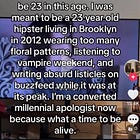Millennial culture died in 2017
Why a defining generation only got four years on top
Embedded is your essential guide to what’s good on the internet, written by Kate Lindsay and edited by Nick Catucci.
Hollywood should invent a TV show about someone who is 32.—Kate
New on ICYMI: Do you know the deal with Theo Von? Neither did I, so we tried our best to figure it out:
Head over here to subscribe to ICYMI wherever you listen to podcasts 🫶
No generation is as thoroughly stereotyped as Millennials. Boomers can’t use technology, Gen X are the forgotten middle children, and Gen Z are unserious, but only Millennials can give away their generational affiliation with something as subtle as a facial expression. There’s a long list of minor and major infractions that fall under the umbrella of “millennial cringe.” Girls and The Office and girlbossing, as a whole, have been othered as a purely us thing, despite the fact that none of them have been an active threat in, in some cases, over 10 years.
In fact, it’s hard to name a single defining millennial moment that occurred after 2017, despite the fact that I, firmly a millennial, was just 25 at the time—still in what should have been the “prime” of my generation’s defining years. The reason Girls felt so impactful was because so many of us were living our life stages right alongside the characters, but we believed we still had many more ahead of us with which to make our mark. Instead, the window abruptly shut.
If you would like to submit anything else for millennial culture consideration, sorry—you’re too late. Instead, the 74.2 million millennials in the United States, ranging from their early thirties to their mid-forties, are broadly defined by about four specific years in the 2010s. We did not do this to any other generation. To pick four years from the ’80s to encompass the entirety of Gen X would be arbitrary and inadequate, but too bad. I’m gonna base all my assumptions about you off of Alf (1986-1990) now.
When I was looking into this (Googling “what is baby boomer culture”) I came across an interesting Reddit post. “What decade or set of years did the baby boomers become culturally irrelevant?” the OP asks. One user offers the following breakdown:
In total, each generation gets roughly close to 30 years of cultural relevancy but two of those decades they have to share with the previous and subsequent generations respectively, so it roughly falls close to this:
60s - Silent Gen / Baby Boomer transition
70s - Baby Boomer dominant
80s - Baby Boomer / Gen X transition
90s - Gen X dominant
2000s - Gen X / Millennial transition
2010s - Millennial dominant
2020s - Millennial / Gen Z transition
I generally agree with this, but Millennials and Gen Z are deviating from the pattern. I don’t know about you, but I’ve witnessed no “transition” to speak of. Everything that’s happened in the 2020s is generally assigned to Gen Z. Even if millennials participate in those things, like TikTok and Labubus, we’re seen as guests on the trend, rather than active contributors to it.
Keep reading with a 7-day free trial
Subscribe to Embedded to keep reading this post and get 7 days of free access to the full post archives.



